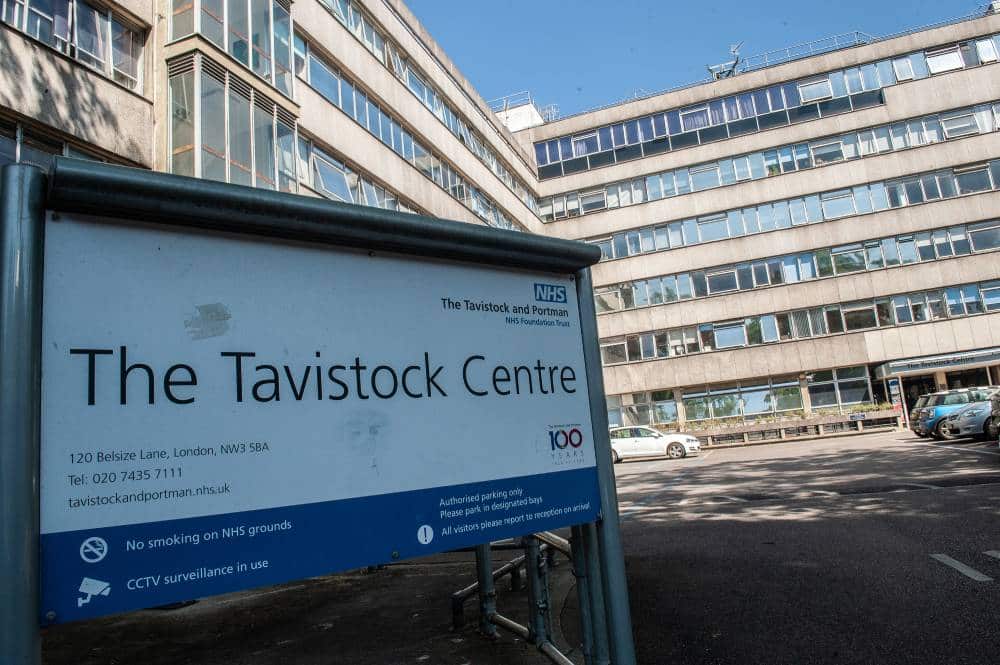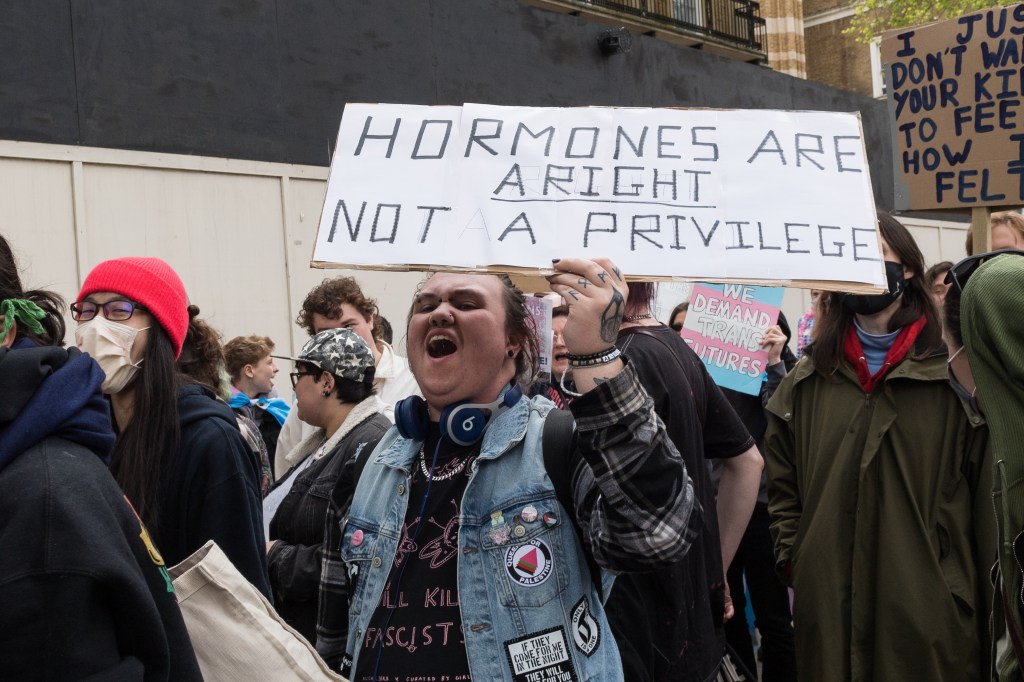No evidence of ‘explosion’ in trans youth suicides after puberty blocker restrictions, says review

A government review has denied a ban on puberty blockers has increased trans suicide rates (Wiktor Szymanowicz/Future Publishing via Getty Images)
An independent review ordered by the UK government has concluded that restricting trans youngsters’ access to puberty blockers has not resulted in an “explosion” in suicide rates, despite the fears of campaigners.
The review sought to examine if there has been a large rise in suicides by young patients of the now-closed youth gender services at the Tavistock and Portman NHS Foundation Trust after the Good Law Project alleged that the restrictions had led to increased numbers of young people taking their own lives.
Puberty blockers are a medicine used in gender-affirming care that prevents puberty from starting, by blocking hormones such as testosterone and oestrogen that lead to changes in the body. In the case of trans youth, it can delay unwanted physical changes such as menstruation, breast growth, voice changes or facial-hair growth.
The review found that campaigners’ allegations were not supported by evidence and the way in which the topic of suicide has been discussed on social media in relation to the claims was “insensitive, distressing and dangerous”.
Led by the head of National Suicide Prevention Strategy for England, professor Louis Appleby, the review dismissed claims by the Good Law Project that there has been a “surge” and “an explosion” in young trans people taking their own lives following the High Court ruling in the case of Bell v Tavistock in 2020.
High Court judges had ruled that it was “doubtful” whether 14 and 15 year olds could understand “the long-term risks and consequences” of taking puberty blockers, followed by hormone replacement therapy (HRT), and it was “highly unlikely” children under the age of 13 would be competent to give consent. In response, the NHS immediately paused patient referrals for puberty blockers from the Gender Identity Development Service (GIDS) at the Tavistock.
The ruling was overturned less than a year later, with the Court of Appeal saying the High Court was “not equipped” to rule on whether trans kids can consent to puberty blockers – known as Gillick competence – and that “it would have been better to avoid controversial factual findings”.

Claims of a rise in the number of transgender youngsters taking their own lives, alongside claims that “NHS management has sought to suppress that evidence” were raised by the Good Law Project in June, firstly in a thread on X/Twitter by founder Jolyon Maugham and subsequently in an article on the organisation’s website.
The claims are said to be based on information provided by two unnamed whistle-blowers who formerly worked at Tavistock, as well as on publicly available documents and records of the centre’s board meetings.
The Good Law Project claimed in the article that the two whistle-blowers allege in the seven years prior to the High Court decision, there was one death of a young person on the GIDS waiting list but in the three years afterwards, that number shot up to 16.
The organisation said the whistle-blowers “explained how staff at the Tavistock raised concerns about this increase and planned an open letter, but were threatened with disciplinary action. And they’ve talked to us about deliberate attempts to suppress these figures”.
The Good Law Project’s assertions came in the wake of subsequent restrictions on puberty blockers.
In March, NHS England made the decision to only allow puberty blockers to be available to young people as part of clinical research trials, while in May – following the publication of the Cass Report – the then health secretary Victoria Atkins introduced regulations to halt new private prescriptions of puberty blockers for anyone under the age of 18.
Those regulations have now been made permanent by Labour health secretary Wes Streeting, who defended his decision, saying any steps he takes will “always be based on evidence, rather than politics or political pressure”. The Good Law Project was already in the process of challenging the ban.
In his review, psychiatrist Appleby concluded: “The data do not support the claim that there has been a large rise in suicide by young patients attending the gender services at the Tavistock since the High Court ruling in 2020 or after any other recent date.”
Appleby outlined available data from NHS England which showed there had been 12 suicides of current and former young Tavistock gender patients between 2018 and 2024, half of whom were children under the age of 18.
He said that in the three years leading up to 2020-2021, there had been five suicides in total among under-18s and over-18s, compared to seven suicides in the three following years.
“This is essentially no difference, taking account of expected fluctuations in small numbers, and would not reach statistical significance. In the under-18s specifically, there were three suicides before and three after 2020-21,” he said.
Appleby noted there were limitations because the figures are for NHS years which run from April to March and “so the timing of the High Court judgement does not fall neatly between”, meaning they do not include details of where in the care pathway the patients were when they died, and there was no further information on deaths described as being from other causes or “not confirmed as suicide”.
While these could b e unnatural deaths, possibly suicides, it is impossible to confirm with the lack of detail available.
He went on to say later in the review that with “small numbers, single-figure differences can be expected and causal explanations are unreliable”.

Appleby also said the evidence available on suicide risk in children and young people with gender dysphoria is “generally poor” and “methodologically weak” because it was “based on online surveys and self-selected samples, and coming from biased sources”.
He did not specify what these sources were.
Over the years there has been much research carried out into trans mental health and suicidal ideation. In 2023, a long-term study found trans people in Denmark had attempted to take their own lives at 7.7 times the rate of cisgender people, with the death rate 3.5 times higher for trans people than their cis counterparts.
An earlier American study found that half of trans and non-binary youth in the country had considered suicide in the past year, with five to 10 per cent of participants also revealing that they had been subjected to conversion therapy practices.
Another study by the same charity, The Trevor Project, found that a quarter of young Black trans and non-binary people in the US had attempted to end their own lives.
Appleby also took aim at the way in which suicide was discussed, noting that the X/Twitter thread was “retweeted thousands of times by other campaigners and members of the public” and “leading journalists”, “though there is nothing to suggest they have examined the evidence for themselves [and] they, too, have adopted the language of ‘dying children’.”
He went on to say: “The way this issue has been discussed on social media has been insensitive, distressing and dangerous, and goes against guidance on safe reporting of suicide. One risk is that young people and their families will be terrified by predictions of suicide as inevitable without puberty blockers. Some of the responses on social media show this.
“Another is identification, already-distressed adolescents hearing the message that ‘people like you, facing similar problems, are killing themselves,’ leading to imitative suicide or self-harm, to which young people are particularly susceptible.
“Then there is the insensitivity of the ‘dead child’ rhetoric. Suicide should not be a slogan or a means to winning an argument. To the families of 200 teenagers a year in England, it is devastating and all too real.”
PinkNews has contacted the Good Law Project and a spokesperson told us the organisation had “nothing to add at this time”.
However, Maugham has been quoted by various media outlets, saying: “I was not contacted in advance of the statement being released and will obviously need time to respond. I do have difficulties with the figures and analysis and will respond in due course.”
Suicide is preventable. Readers who are affected by the issues raised in this story are encouraged to contact Samaritans on 116 123 (www.samaritans.org), or Mind on 0300 123 3393 (www.mind.org.uk). Readers in the US are encouraged to contact the National Suicide Prevention Line on 1-800-273-8255.
How did this story make you feel?

